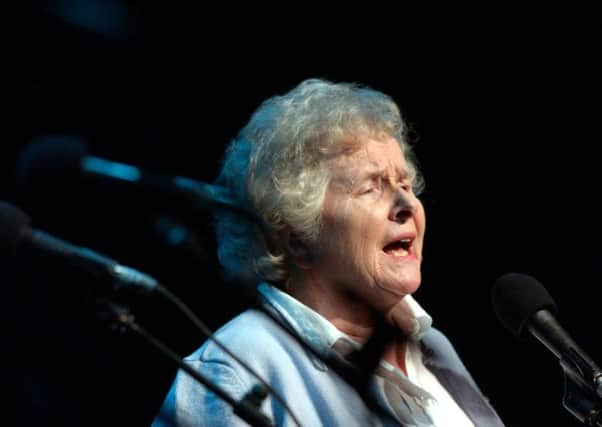Obituary: Flora MacNeil, MBE, Gaelic singer and tradition-bearer


IN AUGUST 1951, the first Edinburgh People’s Festival Ceilidh was held in Edinburgh’s Oddfellows Hall, part of a politically driven alternative to the early Edinburgh Festival. Heralding the advent of the Scottish folk revival, it introduced the glories of traditional Highland and Lowland song to many, not least the late Norman Buchan, MP and folk music activist, who later described his moment of epiphany: “Flora MacNeil was singing The Silver Whistle: beautiful! I’d never heard anything like this.”
Flora MacNeil, then just 23 and not long arrived in Edinburgh from her native island of Barra, would go on to cast a similar spell over audiences as far apart as Ireland and Brazil.
Advertisement
Hide AdAdvertisement
Hide AdWidely regarded as one of the finest traditional singers in Scotland, her onstage presence combined poise and authority with utter musicality and a great warmth that communicated immediately to non-Gaelic speaking audiences and made her a figurehead of the Gaelic music revival.
As the carrier of a venerable, oral tradition of Gaelic singing, she brought the songs – so far as public performance was concerned – out of the constricting formalities imposed by Mòd competition platforms and Marjory Kennedy-Fraser settings.
She could give spellbinding accounts of songs of worthy pedigree, such as Seathan Mac Righ Eirean – “Seathan, Son of the King of Ireland” (which she sang as a magisterial lament, rather than its waulking song version) or Mo Run Geal Og – “My Fair Young Love”, but whatever she sang, be it some swaggering island vaunting, lament or rhythmic waulking song, it emerged naturally from a stream of orally transmitted culture going back generations.
As Neil Fraser, a former deputy controller of Radio Scotland, remarked in a 1999 documentary on the singer, “Flora has kept faith with the tradition. But for her and others like her, most of our heritage would be beneath the sod with the previous generation.”
Awarded an MBE in 1992 for her services to Gaelic music, and inducted into the Scottish Traditional Music Hall of Fame in 2005, she made just three albums.
The first was an early recording on the short-lived Gaelfonn label, followed by Craobh nan Ubhal – “The Apple Tree”, in 1976 and Orain Floraidh – Songs of Flora MacNeil, in 1999, both with Temple Records.
However, during the two decades between these two recordings, the apple tree did indeed bear fruit, and she was delighted to see renewed interest in Gaelic song flourishing and the emergence of a younger generation of popular performers such as Karen Matheson and Julie Fowlis – not least due to her own inspiring example.
Fowlis described MacNeil yesterday as “a truly great traditional singer”, and recalled being introduced as “a Scottish Gaelic singer” to the Irish folk troubadour Liam Clancy at Tønder festival in Denmark: “He immediately took me by the hand, sat me down, and asked if I knew of Flora MacNeil, then regaled me with animated stories of when they met and how much he loved her voice. She was revered far and wide for her singing, and I feel fortunate to have known and sung with her.”
Advertisement
Hide AdAdvertisement
Hide AdMacNeil was born on Barra on 6 October, 1928, and grew up with her brother and sister in a Gaelic-speaking and highly musical household in Ledaig, near Castlebay.
Domestic ceilidhs were commonplace: her mother, Anne Gillies and her aunt, Mary Gillies, in particular, were bearers of a rich heritage of hundreds of songs and she absorbed repertoire not just from them but from other island singers – “as naturally as breathing”, as she would later put it.